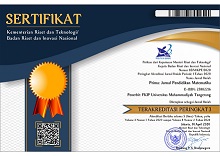Analysis Of Students' Problem-Solving Abilities Based on Cognitive Style
Abstract
This research departs from the problem that students do not have adequate mathematical ability to solve complex problems. This study aims to investigate students' mathematical problem-solving skills based on cognitive styles and identify the difficulties students face in solving problems. The research method used was an explanatory sequential mixture conducted at SDN Ncera, and the research subjects were selected using purposive sampling. The test instruments used are MFFT, description test, and interview. Data analysis uses quantitative descriptive analysis and qualitative descriptive analysis. The results showed that 1) grade V students of SDN Ncera with impulsive cognitive styles were more than students with reflective cognitive styles in mathematical problem-solving skills. Impulsive students tend to be rushed and less check their answers, resulting in incorrect solutions, while reflective students provide more accurate solutions even if it takes longer. 2) The results of the identification of students' difficulties in solving problems showed that students with a reflective cognitive style already understood information formulas and could solve problems related to the area of the parallelogram. However, he did not re-examine his work and conclude the results of his work. Meanwhile, students with impulsive cognitive styles showed that students experienced difficulties, especially in the steps of implementing the plan and checking the final results. Students make mistakes in calculations because they do not spend enough time and are not thorough.
Keywords
Full Text:
PDFReferences
Ames, H., Glenton, C., & Lewin, S. (2019). Purposive sampling in a qualitative evidence synthesis: a worked example from a synthesis on parental perceptions of vaccination communication. BMC Medical Research Methodology, 19(1), 26. https://doi.org/10.1186/s12874-019-0665-4
Chen, C. (2021). A Study on the Relationship Between Reflective-impulsive Cognitive Styles and Oral Proficiency of EFL Learners. Theory and Practice in Language Studies, 11(7), 836–841. https://doi.org/10.17507/tpls.1107.10
Choudhary, N. K. (2015). Study of Problem-Solving Ability Among Senior Secondary School Students. Indian Journal of Applied Research, 5(6), 128–130.
Denieffe, S. (2020). Commentary: Purposive sampling: complex or simple? Research case examples. Journal of Research in Nursing, 25(8), 662–663. https://doi.org/10.1177/1744987120928156
Durasa, H., Mertasari, N. M. S., & Pujawan, I. G. N. (2024). Implementasi Problem-Based Learning Berdasarkan Independensi Belajar Untuk Meningkatkan Kemampuan Pemecahan Masalah Dengan Mengontrol Kecemasan Matematis. AKSIOMA: Jurnal Program Studi Pendidikan Matematika, 13(2), 620–632. https://doi.org/https://doi.org/10.24127/ajpm.v13i2.7102
Faisal, F., Srimuliati, S., Ulya, K., & Damayanti, L. (2023). Profil Penalaran Matematis Siswa Berdasarkan Gaya Kognitif Reflektif dan Impulsif. Jurnal Ilmiah Pendidikan Matematika Al Qalasadi, 7(1), 94–109. https://doi.org/10.32505/qalasadi.v7i1.6162
Fatmala, E., Dwijayanti, I., & P, A. S. (2022). Profil Kesulitan Siswa dalam Pemecahan Masalah pada materi SPLDV ditinjau dari Gaya Kognitif Reflektif dan Impulsif Pada Masa Pandemi-covid-19. JURNAL SILOGISME : Kajian Ilmu Matematika Dan Pembelajarannya, 7(1), 48–56. https://doi.org/10.24269/silogisme.v7i1.3295
Grigoriev, E. P., Galchenko, A. S., & Poskotinova, L. V. (2022). Relationship of parameters of the impulsivity – reflexivity cognitive style with propensity to Internet addiction in high school students. Bulletin of Siberian Medicine, 21(2), 27–32. https://doi.org/10.20538/1682-0363-2022-2-27-32
Hidayanto, E., Permadi, H., & Lestari, W. I. (2022). Thinking process of reflective impulsive cognitive style's student to solving the mathematics problems. International Conference On Recent Advances In Modeling And Simulations Techniques In Engineering And Science (RAMSTES-2021), 030039. https://doi.org/10.1063/5.0102188
Jamil, A. F., Inganah, S., & Prasetya, A. (2022). Proses Berpikir Kreatif Siswa Dalam Membuktikan Identitas Dasar Trigonometri Ditinjau Dari Gaya Reflektif-Impulsif. AKSIOMA: Jurnal Program Studi Pendidikan Matematika, 11(2), 1095. https://doi.org/10.24127/ajpm.v11i2.4822
Karla, D., Pandey, V. K., Rastogi, P., & Kumar, S. (2022). A Comprehensive Review on Significance of Problem-Solving Abilities in Workplace. World Journal of English Language, 12(3), 88. https://doi.org/10.5430/wjel.v12n3p88
Lee, V., & Landers, R. N. (2022). Sampling Strategies for Quantitative and Qualitative Business Research. In Oxford Research Encyclopedia of Business and Management. Oxford University Press. https://doi.org/10.1093/acrefore/9780190224851.013.216
Naza, K., & Syamsuri, S. (2022). Students Creative Thinking Ability with Reflective Cognitive Style on The Phytagoras Theorem. Journal of Education and Learning Mathematics Research (JELMaR), 3(2), 159–171. https://doi.org/10.37303/jelmar.v3i2.90
OECD. (2023). PISA 2022 Results: Factsheets Indonesia. https://www.oecd.org/publication/pisa-2022-results/country-notes/indonesia-c2e1ae0e/
Pane, I., Hadju, V. A., Maghfuroh, L., Akhbar, H., Simamora, R. S., Lestari, Z. W., Galih, A. P., Wijayanto, P. W., Waluyo, Uslan, & Aulia, U. (2021). Desain Penelitian Mixed Method. Aceh: Yayasan Penerbit Muhammad Zaini.
Rochika, N. D., & Cintamulya, I. (2017). Analisis Berpikir Kritis Siswa Bergaya Kognitif Reflektif dan Impulsif pada Pelajaran Biologi melalui Model Means Ends Analysis (MEA) Menggunakan Media Visual. Proceeding Biology Education Conference, 14(1), 562–566. https://jurnal.uns.ac.id/prosbi/article/view/18826
Satriawan, M. A., Budiarto, M. T., & Siswono, T. Y. E. (2018). Students' Relational Thinking of Impulsive and Reflective in Solving Mathematical Problem. Journal of Physics: Conference Series, 947, 012030. https://doi.org/10.1088/1742-6596/947/1/012030
Tamayo, N., Lane, A., & Dewart, G. (2020). Qualitative Description Research: An Examination of a Method for Novice Nursing Researchers. International Journal of Nursing Student Scholarship, 7(51), 1–13. https://journalhosting.ucalgary.ca/index.php/ijnss/article/view/71786
Vranic, A., Rebernjak, B., & Martincevic, M. (2021). Cognitive style: The role of personality and need for cognition in younger and older adults. Current Psychology, 40(9), 4460–4467. https://doi.org/10.1007/s12144-019-00388-6
Widyastuti, E., & Jusra, H. (2022). Mathematical Critical Thinking Ability in Solving HOTS Problems Based on Cognitive Style and Gender. Prisma Sains: Jurnal Pengkajian Ilmu Dan Pembelajaran Matematika Dan IPA IKIP Mataram, 10(3), 535. https://doi.org/10.33394/j-ps.v10i3.5217
Yuniasari, A., & Zainuddin, -. (2019). The Impact of Cognitive (Reflectivity/Impulsivity) on Tertiary EFL Learners' Syntactic Complexity in Descriptive Writing. Advances in Language and Literary Studies, 10(1), 86. https://doi.org/10.7575/aiac.alls.v.10n.1p.86
DOI: http://dx.doi.org/10.31000/prima.v8i3.11920
Article Metrics
Abstract - 1732 PDF - 797Refbacks
- There are currently no refbacks.
Prima: Jurnal Pendidikan Matematika
Program Studi Pendidikan Matematika
Fakultas Keguruan dan Ilmu Pendidikan
Universitas Muhammadiyah Tangerang
Jl. Perintis Kemerdekaan I/33, Cikokol
Kota Tangerang, Indonesia
e-mail: primajpm@gmail.com
Prima: Jurnal Pendidikan Matematika (p-ISSN: 2579-9827 | e-ISSN: 2580-2216) is licensed under a Creative Commons Attribution 4.0 International License.







